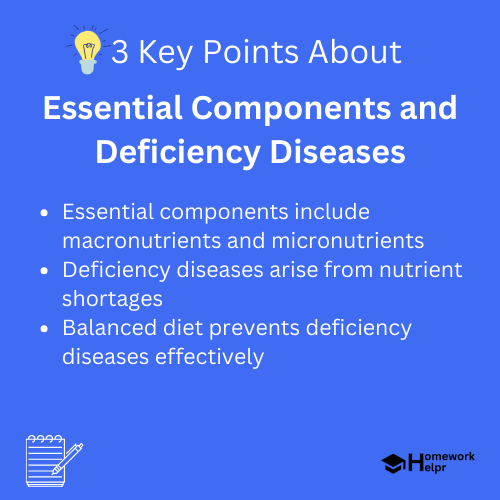📝 Summary
Understanding the essential components of nutrition is vital for good health. These are divided into macronutrients and micronutrients, including carbohydrates, proteins, fats, vitamins, and minerals. A deficiency in any of these can lead to various deficiency diseases. Macronutrients provide energy and include carbohydrates, proteins for growth, and fats for hormone production. Micronutrients, like vitamins and minerals, are needed in smaller amounts but are crucial for functions such as metabolism and immune response. A well-balanced diet prevents these deficiencies and promotes overall well-being.
Essential Components and Deficiency Diseases
Understanding the essential components of our diet is crucial for maintaining good health. Essential components are mainly categorized into macronutrients and micronutrients. These elements include carbohydrates, proteins, fats, vitamins, and minerals, which are vital for the proper functioning of our bodies. A deficiency in any of these components can lead to various diseases, collectively known as deficiency diseases. This article will explore these components, their importance, and the diseases they may cause when lacking.
Macronutrients: The Building Blocks of Nutrition
Macronutrients provide the energy that our bodies need to function. They are categorized into three main types: carbohydrates, proteins, and fats. Each of these plays a unique role in bodily functions.
- Carbohydrates: These are the primary source of energy for our bodies. They are found in foods such as bread, pasta, rice, and fruits.
- Proteins: Essential for growth and repair, proteins are made up of amino acids. Good sources include meat, beans, and nuts.
- Fats: While often viewed negatively, fats are essential for hormone production and nutrient absorption. Healthy fats are found in avocados, olive oil, and fish.
Deficiency in any of these macronutrients can lead to serious health issues. For example, a lack of carbohydrates can cause fatigue, while insufficient protein intake can lead to muscle wastage.
Definition
- Macronutrients: Nutrients required in large amounts for energy and growth.
- Amino Acids: The building blocks of proteins, which are crucial for various bodily functions.
Examples
- Eating whole grains provides carbohydrates that give energy.
- Consuming beans and legumes ensures adequate protein intake.
- Incorporating nuts into your snacks helps you get healthy fats.
Micronutrients: The Necessary Trace Elements
Micronutrients, which include vitamins and minerals, are required in smaller quantities but are equally crucial for health. Each micronutrient plays a significant role in physiological functions, including metabolism and immune response.
- Vitamins: These organic compounds are vital for numerous bodily functions. For example, Vitamin C is essential for skin health and immune function, while Vitamin D aids in calcium absorption.
- Minerals: Essential inorganic elements like iron, calcium, and potassium, play a role in muscle function, bone health, and enzyme reactions.
Deficiencies in micronutrients can lead to serious health conditions. For instance, a lack of Vitamin A can cause vision problems, while insufficient iron can lead to anemia, a condition characterized by fatigue and weakness.
Definition
- Micronutrients: Nutrients required in small amounts that are essential for various bodily functions.
- Anemia: A condition where you lack enough healthy red blood cells to carry adequate oxygen to your body’s tissues.
Examples
- Including citrus fruits in your diet can help fulfill Vitamin C needs.
- Dark leafy greens are a great source of iron.
- Consuming dairy products helps to receive calcium.
Common Deficiency Diseases
When it comes to deficiency diseases, several conditions arise due to the inadequate intake of essential nutrients. Here are some common deficiency diseases associated with micronutrient shortages:
- Scurvy: Caused by a lack of Vitamin C, symptoms include weakness, anemia, and skin problems.
- Rickets: A disease caused by Vitamin D deficiency, leading to weak or soft bones in children.
- Goiter: This condition arises from insufficient iodine, leading to an enlarged thyroid gland.
Additionally, macronutrient deficiencies also lead to significant health problems. For example, a diet low in proteins can result in a condition called kwashiorkor, characterized by swelling and irritability, especially in children.
Definition
- Scurvy: A disease characterized by bleeding gums, weakness, and fatigue due to Vitamin C deficiency.
- Rickets: A condition causing soft and weak bones in children due to Vitamin D deficiency.
❓Did You Know?
Did you know that the word “scurvy” comes from the Middle Dutch word “schorve,” which means “to dry out”? This refers to the symptoms that appear when the body lacks Vitamin C!
Preventing Deficiency Diseases
Prevention is always better than cure. To avoid deficiency diseases, a balanced diet rich in essential components is essential. It’s crucial to include a variety of foods in your diet to cover all necessary nutrients. Here are some tips for maintaining a healthy diet:
- Eat a rainbow of fruits and vegetables to ensure a range of vitamins and minerals.
- Incorporate whole grains for added fiber and energy.
- Include protein sources such as fish, eggs, and legumes in your meals.
- Limit processed foods, which often lack essential nutrients.
It’s also advisable to consult a healthcare professional to assess your dietary needs and determine whether supplements are necessary. Regular health check-ups can help identify any deficiencies early on.
Conclusion
In conclusion, understanding the essential components of our diet and the consequences of their deficiencies is vital for overall health and well-being. By incorporating a variety of macronutrients and micronutrients in our meals, we can lead healthier lives and minimize the risks of deficiency diseases. Remember, nutrition should never be overlooked as it plays a pivotal role in growth, development, and daily activities.

Related Questions on Essential Components and Deficiency Diseases
What are essential components of diet?
Answer: They include macronutrients and micronutrients.
What are common deficiency diseases?
Answer: Examples include scurvy, rickets, and kwashiorkor.
How can deficiency diseases be prevented?
Answer: By maintaining a balanced and varied diet.
What role do micronutrients play?
Answer: They are essential for metabolism and immune functions.
